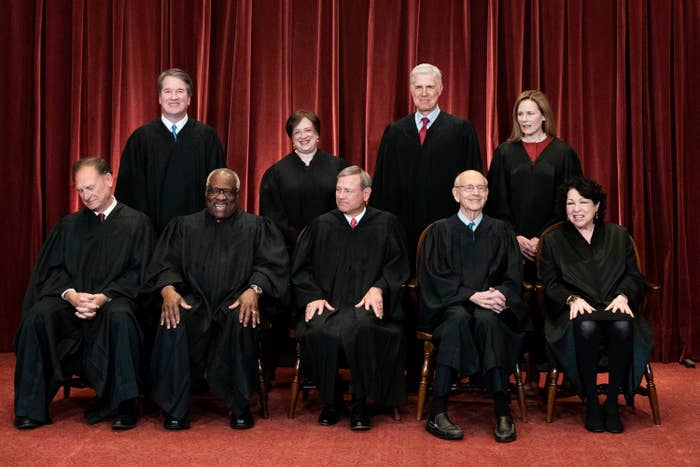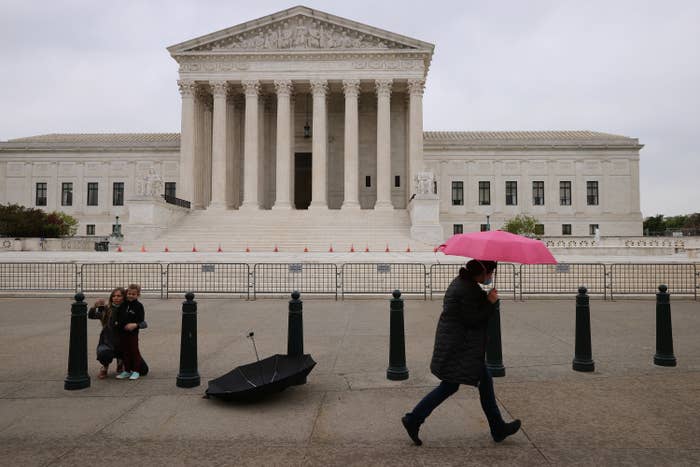
When Mississippi passed a law in early 2018 that banned nearly all abortions after 15 weeks of pregnancy, state officials and anti-abortion advocates knew it was unlikely to survive challenges in the lower courts. The goal was to get to the US Supreme Court.
The strategy worked. On Monday, the court announced it would hear the Mississippi case during the next term and consider whether any ban on abortion before a fetus is viable — that is, before it can survive outside of a person’s womb — is unconstitutional. It’s a question that lower courts had considered settled as they repeatedly blocked the Mississippi law and other similar bans that were enacted in more than 10 states during the Trump administration.
That the court is taking up the Mississippi case now is a sign that at least some of the justices are open to revisiting — and potentially dismantling — abortion rights that had been established for decades. It’s also the first major abortion case that the court will hear since Justice Amy Coney Barrett was confirmed in October 2020, deepening the conservative majority to 6–3.
The effort to get abortion back before the Supreme Court took shape shortly after Donald Trump won the presidency in 2016. In a bid to gain the powerful endorsements of major figures in evangelical and Catholic communities, the former president vowed to focus on repealing abortion rights and overturning Roe v. Wade by appointing conservative justices with anti-abortion views. Groups like Americans United for Life and the National Right to Life Committee began constructing and disseminating highly restrictive anti-abortion laws through state legislatures and launching education campaigns to get state politicians on board.
Over the next four years — which saw the confirmation of three conservative justices, Barrett, Neil Gorsuch, and Brett Kavanaugh — state legislatures sent a string of previability abortion bans and other anti-abortion laws to the desks of Republican governors. In 2019 alone, 12 governors signed 58 restrictive laws, ranging from requiring doctors to read a script containing anti-abortion information ahead of the procedure to imposing blanket bans on abortions after 6 weeks of pregnancy.
Abortion rights groups wary of teeing up cases for a solidly conservative Supreme Court to revisit the protections of Roe and other abortion rights cases found themselves caught in a bind: to let the bans pass in a small number of states, limiting abortion access for thousands of women, or to play into the plans of anti-abortion activists and file lawsuits that would give conservatives a way to pitch the issue to the justices, potentially impacting abortion rights nationwide. They chose the latter, hoping the Supreme Court would refuse to take up the bans at all.
“Alarm bells are ringing loudly about the threat to reproductive rights,” Nancy Northup, president of the Center for Reproductive Rights — which has been leading the lawsuits challenging state abortion bans — said in a statement Monday. “Already, abortion is nearly impossible to access for people in states like Mississippi, where lawmakers have been chipping away at the right to abortion for decades. We will keep fighting to make sure that people do not lose this fundamental right to control their own bodies and futures.”
Several prominent anti-abortion groups, including Susan B. Anthony List and March for Life, framed the court’s decision to hear the Mississippi case as a win for their broader efforts to restrict the ability of people to receive abortions later in their pregnancies as well as the push to roll back the protections of Roe v. Wade. The law at issue concerns abortions through the beginning of the second trimester, and Mississippi only asked the court to consider whether states could ban abortions before a fetus is viable.
“Across the nation, state lawmakers acting on the will of the people have introduced 536 pro-life bills aimed at humanizing our laws and challenging the radical status quo imposed by Roe. It is time for the Supreme Court to catch up to scientific reality and the resulting consensus of the American people as expressed in elections and policy,” Marjorie Dannenfelser, president of Susan B. Anthony List, said in a statement.

The Mississippi law, called “The Gestational Age Act,” contains exceptions to the ban in cases of fetal abnormalities and medical emergencies, including a threat to the person’s life or a serious risk of physical impairment, but not in cases of pregnancy from rape or incest.
The law never took effect after then–Mississippi governor Phil Bryant signed it in March 2018. US District Judge Carlton Reeves entered a series of orders blocking it at the time, writing in an opinion in November 2018 that the 15-week ban was “unequivocally” a violation of constitutional rights. He described it as a “disingenuous” effort by the state legislature to pass a law that officials knew was unconstitutional in the hopes of getting abortion back before the Supreme Court.
"The Court’s frustration, in part, is that other states have already unsuccessfully litigated the same sort of ban that is before this Court and the State is aware that this type of litigation costs the taxpayers a tremendous amount of money," Reeves wrote. "No, the real reason we are here is simple. The State chose to pass a law it knew was unconstitutional to endorse a decades-long campaign, fueled by national interest groups, to ask the Supreme Court to overturn Roe v. Wade."
The case then went up to the US Court of Appeals for the 5th Circuit, which agreed with Reeves that previous Supreme Court rulings had been clear that states could not ban abortion before a fetus was viable.
“In an unbroken line dating to Roe v. Wade, the Supreme Court’s abortion cases have established (and affirmed, and re-affirmed) a woman’s right to choose an abortion before viability. States may regulate abortion procedures prior to viability so long as they do not impose an undue burden on the woman’s right, but they may not ban abortions. The law at issue is a ban,” Judge Patrick Higginbotham wrote for the court.
Even Judge James Ho, who was confirmed to the 5th Circuit under Trump and swiftly established himself as a leading conservative voice on the federal bench, wrote separately to indicate he was sympathetic to Mississippi lawmakers but was “required” to uphold the ruling against the state. Ho noted that Mississippi’s lawyers hadn’t asked the court to hold oral arguments, a sign that the state expected to lose on its way to getting to the Supreme Court.
“I am forced to agree with the majority’s application of Supreme Court precedent to this recently enacted and sincerely motivated law, and to conclude that we are duty bound to affirm the judgment,” Ho wrote.
The justices declined to take up two other questions that Mississippi had asked the court to weigh in on, leaving the door open to future abortion fights: what standard courts should use to analyze previability abortion bans, and whether abortion providers should be able to challenge these types of laws as third parties.
The court hasn’t announced a schedule yet for hearing arguments for the next term, which begins in October.

